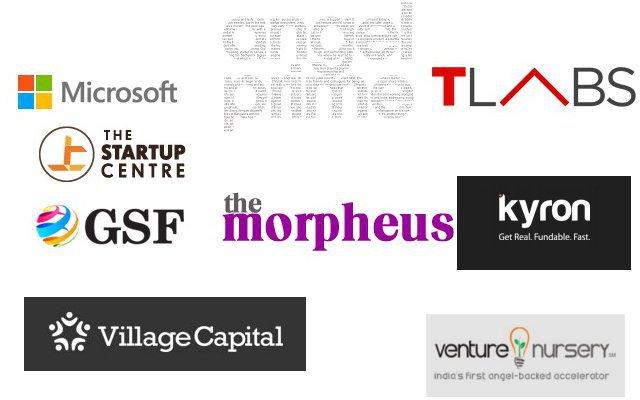Incubators and accelerators are of help to startups because they help focus on the product and encourage pivoting as needed to avoid blind spots. They provide office space and partner credits to keep the costs down. They also bring together a group of smart people who can help each other and learn from each other. However, as good as they are, many of them also mindlessly perpetuate the false mantras borrowed from the West and encourage fundraising over business development.
West has the likes of TechStars, YCombinator, 500Startups but India has so far failed to build a single establishment of their stature.
India has famous Startup Accelerators/Incubators like CIIE, SINE, TLabs, THub, GSF, GHV, Axilor, Microsoft Accelerator, etc, but their success record is still in the pre-pubescent stage. Barclays recently started a major corporate accelerator program called ThinkRise. As the ecosystem matures, who knows they could be leading the global space.
I heard from a VC friend about Morpheus. Their gang is truly impressive, but sadly they’ve shut down the operations.
Some Startup Accelerators/Incubators in India have set up “Silicon Valley” partner programs to give startups a global exposure. But that hasn’t necessarily translated into a success factor for startups.
Founders of 91springboard set out to Start the Ycombinator of India but failed and since then have successfully pivoted to a co-working model. Headstart helps early stage founders in a sort of accelerator way.
Why do we need them in India?
To visualize how necessary and big an opportunity Accelerator/Incubator model is in India, consider this:
- India is home to the 3rd largest number of Startups globally and set to overtake UK by end of 2017 and US by early 2019.
- There are 2500+ Accelerators/Incubators worldwide, out of which India has approx 100, that is only ~4%.
- Startup Ecosystem is in very nascent stages and Failure rate in India is still very high
- Abundance of talent. Over 100 Million people enter the Indian workforce every year.
- Abundance of energy and risk capacity. 65 percent of the people in our country are below the age of 35 years, and 50% are below 25 years.
Are Accelerators/Incubators good for Startups?
DropBox, AirBnB, and Quora – all these companies went through a startup accelerator program.
InShorts, HackerRank, CommonFloor, LittleEye Labs, Practo – all these companies went through a startup accelerator program in India.
The failure rate of Top Accelerator/Incubators <20%. Now compare this to the overall Startup failure rate which by my good judgment is definitely over 80%.
Note: It is important to engage your visitors and make yourself more visible if you want to be seen online. Write blogs and publish them on your site which is informative and can draw your visitor’s attention. Create a subscription database so that each blog that you publish goes to these recipients, thus increasing your site traffic. Content optimization helped our clients increase their traffic by almost 300 percent. Check our healthcare digital marketing and legal digital marketing services for success.
Problems facing the Industry / What needs to be Fixed:
- The Intangible support provided is either insufficient due to lack of manpower or isn’t good enough.
- Gyaan is a very big thing in India and most people are interested in providing just that.
- Lack Successful Graduated Entrepreneurs who can mentor the incoming batch.
- Lack the depth of network of successful startups/founders actually willing to help.
- Lack Ex-Startup founders as Full-time mentors who have been there, done that. Startups benefit most when they feel they have a common and shared experience with a leader who has historically been a startup founder that has been through similar trials and tribulations and successfully exited their own business.
- Many Accelerators/Incubators are owned by the affluent class and run by individuals who do not necessarily have enough motivation and skin in the game.
- Very few Corporate Accelerators.
- Lack of individual training of each founder. Teaching the tech founders about business and the business founders about tech.
- A lot of focus is there to make your startup VC fundable rather than develop alternate strategies for building the business.
- Majority of Colleges/Universities do not have the requisite talent to assist students in building viable businesses.
- Accelerators/Incubators need to continue the relationship post the demo/graduation day.
Closing Note:
As the Startup ecosystem in India matures, we hope that more Accelerators/Incubators will pop up, and there will be a lot more founders to help build a stronger foundation of new startups.
“If you’re lucky enough to do well, it’s your responsibility to send the elevator back down.” – Kevin Spacey




